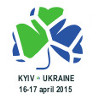225 participants from 30 countries attended the conference, which was held from 16-17 April, 2015 in Kiev. “Greening the economy” was the central thread that ran through the programme and the discussions throughout the conference and highlighted the socio-environmental benefits of organic agriculture and its great potential for leveraging a transition to a Green Economy in the agricultural sector.
The conference was opened by Iaroslav Krasnopolskyi, First Vice- Minister in Ukraine’s Ministry of Agrarian Policy and Food, Asad Naqvi, Acting Head Green Economy Advisory Services Unit, Economics and Trade Branch UNEP, Switzerland, André Leu, President IFOAM Organics International, Australia, and the two organizers Dr. Eugene Milovanov, President of Organic Federation of Ukraine, and Gerald A. Herrmann, Director Organic Services, Germany. As well as the Ministry of Agrarian Policy and Food and the Ministry of Ecology and Natural Resources, the conference’s main supporter was the European Union under the umbrella of the EaP-Green Programme, which is implemented by UNEP.
Broad representation of all stakeholder groups of the organic sector
Most significant was the broad representation of all stakeholder groups in the organic sector, ranging from practices in food manufacturing and farming to trade represented by importers and exporters, certification bodies active in the region, ministries and public authorities and other relevant players like NGOs and consultants. Intense discussions during the workshops and the buzz of conservation during the lunch and coffee breaks confirmed the high level of interest in the conference topics. These discussions were fuelled by the great interest in the supply of protein grain and cereals from the region as well as by the lack of clarity about the reasons for residues found in sunflower press cake from Ukrainian sources in November 2014, which triggered EU (e.g. German) competent authorities to block further marketing of press cake and cereals from the same sources, with the EU de-accrediting the certifier concerned. Thus, the participants underlined the fact that the conference was the best meeting place in the region.
Presentations covered a wide range, from market studies to cases of specific companies. Breakout sessions concentrated on organic legislation, organic markets for grain and oilseeds, quality and integrity and local market development, and they deepened the participants’ understanding of the correlation between organic agriculture and the green economy. The conference programme can be accessed here. Most presentations are published here.
A more detailed report can be found on www.organic-market.info


